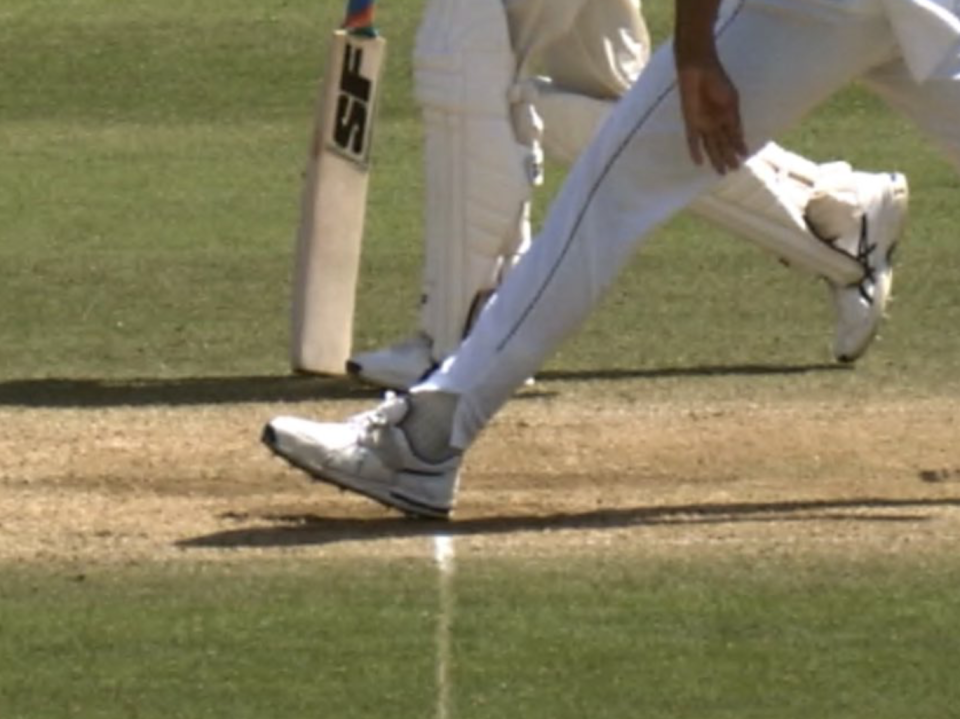TV umpire set to take over calling of front-foot no-balls

The days of on-field umpires being responsible for calling front-foot no-balls are numbered, with the task set to be transferred to the television umpire for top-tier international cricket.
In the wake of the First Test between England and West Indies, where three wickets were overturned by the third official when retrospectively checking the bowler’s front foot, The Independent has learned that the transformed process, used in this year’s Women’s T20 World Cup, will be adopted full time for leading International Cricket Council competitions.
As the playing conditions for the current World Test Championship have already been agreed, the status quo will prevail in that form of the game for now. However, the powerful ICC Chief Executives’ Committee will consider the reform before the next WTC cycle begins in mid-2021.
But considered a resounding success during the women’s T20 tournament, which followed a comprehensive trial across 12 ODIs, the ICC has given the green light for the technology to be used in the inaugural World Cup Super League – the two-year ODI competition which was set to begin in May before Covid-19 put it on hold. This amended playing condition will also apply for the next men’s T20 World Cup, scheduled for October but is likely to be delayed when a decision is taken by the ICC board on Monday.
Under the system, the television umpire monitors the front foot with a Hawkeye freezeframe then a super slow-motion replay, signalling to the central umpire, through a buzzer when the bowler breaks the line. At that point, the on-field official unfurls their arm, about eight seconds after the delivery - well before the bowler is back at the top of their mark.
The process of TV umpires checking the front-foot has been common practice since the implementation of the Decision Review System from 2008. But it was in 2016 when the shortcoming of the procedure was brought into focus when Richard Illingworth incorrectly called Doug Bracewell for overstepping, a delivery that bowled Adam Voges for seven. With no provision to fix that error, he went on to make a series-defining 239.
Given this elevated risk for on-field officials, with the added scrutiny of making close front-line decisions, it was no surprise last year in Brisbane when 21 uncalled no-balls were sent down by Pakistan in the space of just two sessions, according to pictures collected by the Seven Network broadcast. It reinforced that, quite understandably, umpires have been careful not to end up in the same position as Illingworth by focussing exclusively on the business end rather than a bowlers' foot.
The TV-umpire solution was conceived just months after the Bracewell/Voges episode and was used for five ODIs between England and Pakistan in 2016. Geoff Allardice, the ICC’s General Manager of Cricket, hoped it would be rolled widely and swiftly. However, reform hit a roadblock in 2017 - money. But this year, ahead of the Women’s World Cup, he declared that concern was no more: improved technology had made it more cost-effective.
WAS THIS A NO-BALL? 🤔
He eventually got his man, but here's a look at that initial Gabriel wicket that was called a no-ball... what do you think?
📺 Watch #ENGvWI on Sky Sports Cricket 👉 https://t.co/oyTQkZnmKe
📰 Live blog 👉 https://t.co/EFDeOBsNuE
#️⃣ #raisethebat 🏏 pic.twitter.com/8gMapINwP8— Sky Sports Cricket (@SkyCricket)
Built into the logic of this improved no-ball process is an acceptance that the old-fashioned idea of an ‘early call’ – allowing the striker to swing without fear of being dismissed – has long since been part of the game, especially with the infrequency of no-balls being called. Indeed, at Southampton last week, just three were signalled by the on-field umpires for the entire five days, in addition to three from upstairs when overturning dismissals.
After all this progress, and knowing that a tried and tested solution now exists, it is frustrating that the broken system will remain for the rest of this summer: no-balls will continue to be seldom called unless the bowler takes a wicket with the delivery. But change is coming – for real this time – and the game will be better for it.
Read more
England lose but cricket wins as West Indies clinch first Test
Holder delights in West Indies victory as England rue batting woes
West Indies coach Simmons hails ‘special day’ for his bowlers

 Yahoo Sport
Yahoo Sport 





































